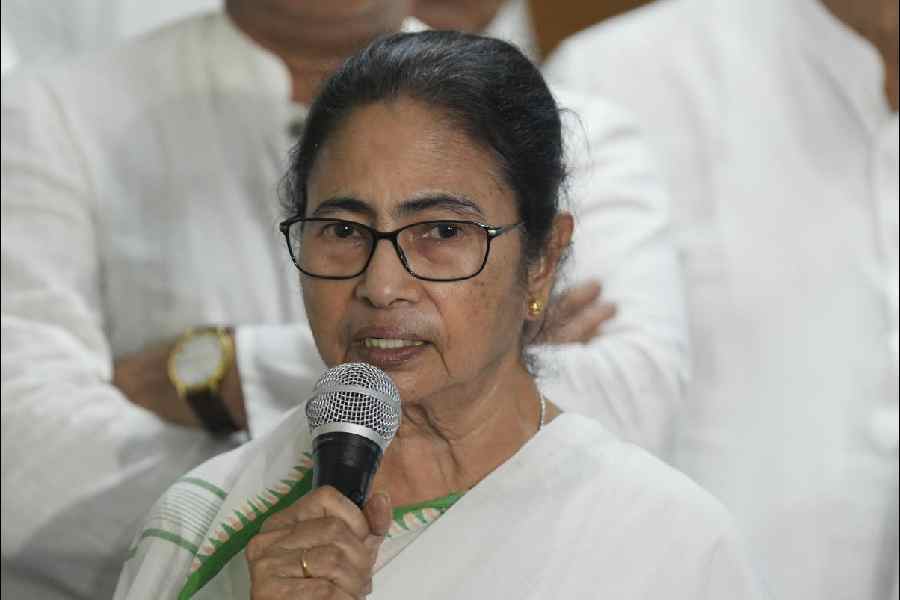A state-level task force comprising four junior doctors, a female medical student and senior government officials will be set up to look into all complaints regarding government medical colleges and district hospitals, chief minister Mamata Banerjee said at a meeting with protesting junior doctors at Nabanna on Monday.
The composition of the task force was among the several issues discussed in the two-hour meeting that was attended by 17 junior doctors and principals and medical superintendents of five government medical colleges in Calcutta.
Mamata appealed to the junior doctors to withdraw their fast and return to work.
She repeated her promise of holding student union elections at medical colleges by March 2025. She also called on everyone to work together to bring back a safe and secure environment to government hospitals.
Chief secretary Manoj Pant had called the meeting after he and home secretary Nandini Chkaravorty visited the junior doctors at their protest site in Esplanade and the chief minister spoke to the protesting doctors over the phone.
The task force announced by the state government on Monday will be headed by the chief secretary. Its other members will include the director-general of police, a member of the state’s health grievance redressal cell and the commissioner of Kolkata Police.
The directive about the task force, its composition and the standard operating procedure (SOP) will be issued by 3pm on Tuesday, Mamata told the junior doctors.
During Monday’s meeting, which started at 5pm, the junior doctors initially told the chief minister that they wanted 10 junior doctors and students to be members of the state-level task force on a rotational basis.
Debashis Halder, one of the junior doctors, told the chief minister that they were not informed about the formation, structure and operations of the task force.
“We are yet to be informed about the function, structure and standard operating procedures of the state-level task force. Moreover, there is no representation from our end. We want at least 10 doctors to be part of it on a rotational basis,” Halder said.
Mamata then said the state-level task force would have only three members from the government and if there were 10 junior doctors, there would be a lack of balance. Also, she pointed out, a large committee would have difficulties in functioning.
“Three government officials and 10 junior doctors! Where is the balance? Is this justified?” Mamata said before asking chief secretary Pant to include two senior resident doctors, two junior resident doctors and a female medical student in the task force.
Mamata also instructed Pant to include the director-general of police, a member of the state’s health grievance redressal cell and the commissioner of Kolkata Police as its other members.
However, it was not made clear how these four junior doctors and the woman student will be selected.
Mamata said the state task force should meet every month to discuss complaints it would receive.
Pant clarified that the state-level task force will act as an apex body.
The government also agreed to the demands of the junior doctors to form stakeholders’ committees at all government medical colleges. The committees will have representatives of postgraduate trainees, interns and students.
The committees will deal with complaints but will be forwarding them to the apex task force for any action.
“The end users of washrooms, toilets, duty rooms at the medical colleges and hospitals will be you, the doctors. You provide your feedback to us regarding the infrastructure that is being built and that which is already in place through these committees. We will issue a directive for this as well,” said Pant.
Mamata told the junior doctors that their feedback would be taken into consideration by the team led by former director general of police Surajit Kar Purakayastha, who is conducting a security audit at all medical colleges and hospitals in the state.
Aniket Mahata, one of the junior doctors, told Mamata that RG Kar Medical College and Hospital, where a 31-year-old postgraduate trainee was raped and murdered on August 9, had an environment of fear.
“I can’t tell you the kind of torture women faced at RG Kar. There were molestations, extortions and threats. As a woman, you will feel scared if I tell you exactly what used to happen with women there,” Mahata told Mamata.
He said many women were scared to lodge complaints and on many occasions, the complaints were not received.
Although he did not take names, Mahata was referring to the tenure of Sandip Ghosh as the principal of RG Kar. Ghosh is in CBI custody on charges of corruption and also in connection with rape and murder.
Kinjal Nanda, another junior doctor present at the meeting, said a safe and healthy environment should be brought back to the medical colleges.
“I agree with Kinjal. We should work together to restore a healthy environment at medical colleges,” said Mamata.
She said at the meeting that everyone should stop bringing allegations against each other and try to restore normality.
Mamata did not agree to a few demands like dissolving the West Bengal Medical Council and the recognition of resident doctors’ associations at the medical colleges.
“The medical council functions under the West Bengal Medical Act, 1914. It is a statutory body and the state cannot interfere,” said chief secretary Pant.
Regarding the recognition of resident doctors’ associations, Mamata said those are not affiliated bodies and hence the state government does not have the power to recognise them.
The junior doctors also submitted documents which they said were evidence backing corruption charges against health secretary Narayan Swaroop Nigam.











